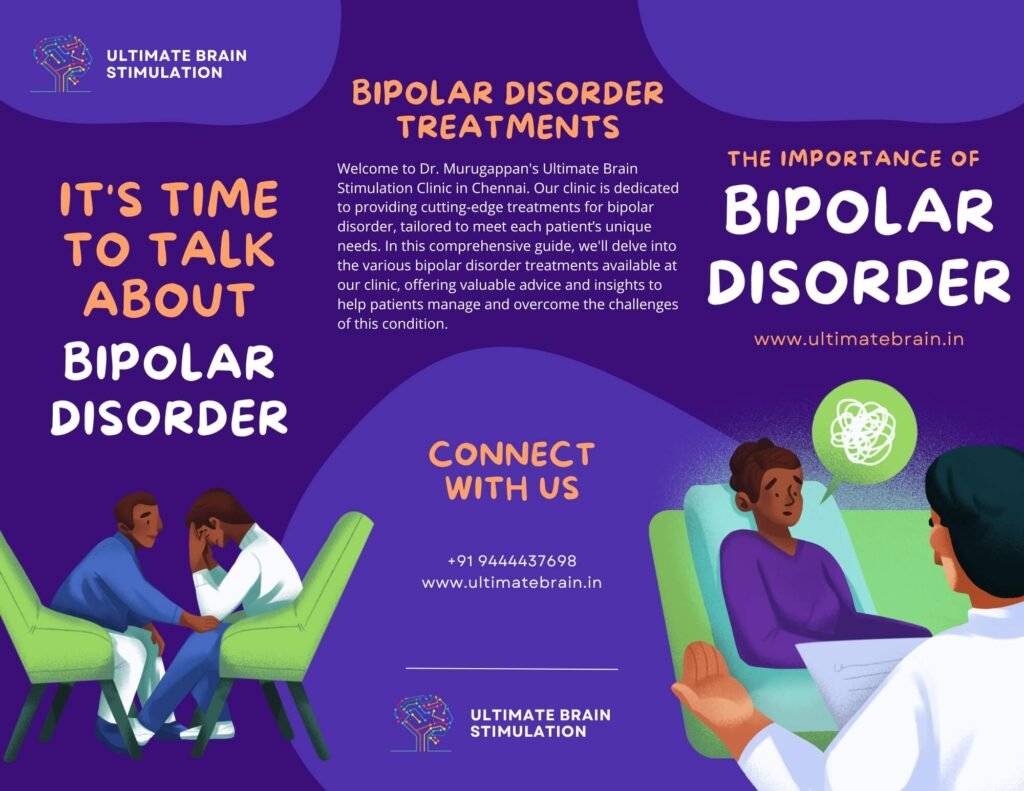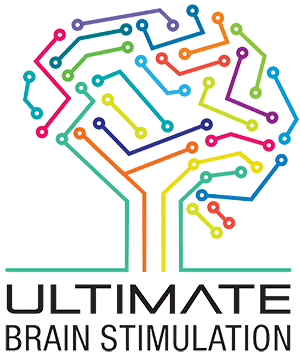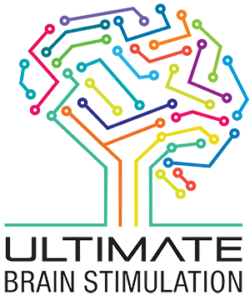Introduction
People who have bipolar disorder need specialised care because it is a difficult and complicated mental illness. Mood swings that are very big, like mania or hypomania, and lows, like sadness, are signs of this disorder. To control these symptoms and make people’s lives better, they need to get medication that works.
About the doctor Murugappan
The Ultimate Brain Stimulation Clinic in Chennai was started by Dr. Murugappan, a top neuropsychiatrist with more than 40 years of experience. Dr. Murugappan has made it his career to help people deal with and get over mental health problems. He does this by having a deep knowledge of how the brain works and by caring for his patients with compassion.
The Best Brain Stimulation Clinic
The Ultimate Brain Stimulation Clinic in Chennai is one of the best places to get help for mental health problems because it focuses on using cutting-edge brain stimulation methods. We aim to improve our patients’ lives by giving them personalised, effective, and new solutions.

How to Understand Bipolar Disorder
There are different kinds of bipolar disease, such as Bipolar I, Bipolar II, and Cyclothymic disease. Mood swings, high energy, and lots of action are some of the symptoms that can happen. Other symptoms include depression, apathy, and feeling like there is no hope. A correct diagnosis from a trained individual is necessary for treatment to work.
Why early intervention is important
Getting help for bipolar illness early can make things a lot better. Quick care can lessen the severity of mood swings, stop complications, and improve the outlook for the future. On the other hand, waiting too long to get treatment can make symptoms worse and make it harder to do things generally.
Comprehensive Treatment Approaches:
Mood stabilisers, antipsychotics, and antidepressants are some of the medicines that are often given to help people deal with their symptoms. Following the treatment plan and talking to your doctor daily is now very important.
Psychotherapy:
Cognitive behavioural therapy (CBT) and interpersonal and social rhythm therapy (IPSRT) are two types of psychotherapy that can help people understand their situation, come up with ways to deal with it, and keep a stable routine.
Newer Methods of Brain Stimulation
TMS stands for transcranial magnetic stimulation.
A Quick Look at the Benefits: TMS is a way to stimulate the brain with magnets without hurting it. Repetitive Transcranial Magnetic Stimulation (rTMS) makes it easier to get along with others and lessens behaviours that are similar to worry and depression. Neuroplasticity is the process of rebuilding the brain, and it helps with that.
How TMS Works:
A psychiatrist places a small coil on the scalp in certain spots that create a quickly changing magnetic field that goes through the skull bone and the scalp. The brain’s activity is affected by this magnetic energy. The doctor decides where to put the coil, what kind of magnetic pulse to use, how fast it should go, how many times it should go, and how strong it should be.
Details about the treatment session:
The treatment can last anywhere from 3 to 40 minutes. There are anywhere from 5 to 30 lessons, which are spread out over 4 to 6 weeks. All studies have shown that safety is the most important thing.
Safety and Effectiveness:
The magnetic coil is put over the chosen area during the session. The person’s sensitivity (resting motor threshold) is found with a test pulse. This information is then used to choose the treatment pulse strength, and the process starts.
There is a clicking or tapping sound during the process, and the person may feel like they are being tapped on the forehead, eyes, or face. At the speed you choose, the magnetic pulse will go on and off during the whole practice. Every time, these lessons are made just for you.
TMS treatment is safe and has been shown to be safe in people with other neuropsychiatric problems, such as epilepsy, ADHD, and so on.
If you feel any pain or discomfort in your scalp during the process, it goes away right away without any problems. TMS is allowed by the FDA to treat depression that doesn’t respond to other treatments.
Other Uses of TMS: rTMS can also help with OCD, anxiety, addictions, schizophrenia, PTSD, arthritis, and getting better after a stroke.
The good things about repetitive transcranial magnetic stimulation therapy are:
- Autism symptoms can be lessened with a high success rate.
- Better behaviour and speech in social situations
- doesn’t hurt, doesn’t sedate, and doesn’t have any side effects
- No anaesthesia is needed. Lessens actions and behaviours that are done over and over.
- Maintains mood and irritability
- Boosts motor performance
- Takes care of attention problems
When will we know if the TMS treatment worked?
After 1-2 meetings, changes in behaviour that can be seen start to happen, and they happen slowly but steadily over time. Sometimes, the changes might not show up for a longer time.
Types of TMS: Some different methods and modes are used. Each mode has its number of pulses, speed, strength, type of coil, and length of treatment. Some of these are:
- There was a theta burst mode in certain modes for only three minutes.
- To get deeper, Deep TMS with H coils is used.
- Even though TMS is pricey, it provides an alternative treatment choice for people who don’t improve with standard antidepressant therapy.
Changes in lifestyle
Having a regular schedule is very important for dealing with bipolar illness. A balanced diet, regular exercise, and regular sleep patterns can all help keep your mood stable and improve your general health.
Helping Hands
People with bipolar illness need a lot of help from their family and friends. Encouraging people to join support groups can also help them emotionally and give them useful tips.
Teaching the Patient
Patients must be taught about bipolar illness for it to be managed well. Knowing about the condition helps people set realistic goals and stay on track with their treatment plans.
Regular checking and following up
Regular follow-ups and ongoing tracking are very important for making changes to treatment plans as needed. This makes sure the patient gets the best care and help possible.
The Ultimate Brain Stimulation Clinic offers new ways to treat health problems.
Our centre has state-of-the-art equipment and treatment plans that are made just for each patient. We are always trying to use the newest developments in brain therapy and mental health care.
Stories of Success
It can be very encouraging to hear from people who have managed their bipolar illness well. There are a lot of reviews and case studies at our clinic that show how well our treatments work.
The Way to Begin
Making an appointment at the Ultimate Brain Stimulation Clinic is the first thing that needs to be done to successfully manage bipolar disorder. During your first visit, you will get a full evaluation that will help the doctor make a personalised treatment plan for you.
In conclusion
Bipolar disease needs to be managed in some ways, such as through medication, therapy, changes in lifestyle, and more advanced treatments. At the Ultimate Brain Stimulation Clinic in Chennai, we are dedicated to giving our patients the best care possible so they can live full lives.
FAQs
- How often do the treatments at the clinic work?
- A lot of people who come to our clinic are successful, especially those who stick to their personalised treatment plans and show up for follow-up appointments on a frequent basis.
- Are there any bad effects that come from brain stimulation?
- Side effects are usually pretty small, but some people may get mild headaches or discomfort in their scalps with TMS, and they may lose their memory temporarily with ECT. Talking to your doctor about possible side effects is important.
- How long do most treatment plans last?
- Treatment lasts for different amounts of time based on the person’s needs. Some people may need treatment for a long time, while others may get better and need fewer visits over time.
- Can changes in living alone help people with bipolar disorder?
- Making changes to your lifestyle is an important part of dealing with bipolar disorder, but they usually work best when used with therapy and medicine.
- How can someone in your family help someone who has bipolar disorder?
- Family members can offer emotional support, push people to stick to their treatment plans, and even join therapy meetings if they need to. Being a part of a support group can also help you understand how to help a loved one.
Make an Appointment Today!
Call us at(+91)9444437698!
For more information, visit Ultimate Brain Stimulation Clinic.
Connect on LinkedIn
Watch on YouTube.
Contact us on WhatsApp.
For additional wellness services, check out Silkee.
References
- National Institute of Mental Health (NIMH) – Bipolar Disorder
- Mayo Clinic – Bipolar Disorder
- American Psychiatric Association – Bipolar Disorder
By adhering to the latest advancements in bipolar disorder treatments and focusing on a patient-centered approach, Dr. Murugappan and his team at Ultimate Brain Stimulation Clinic strive to make a positive impact on the lives of those affected by this condition.

